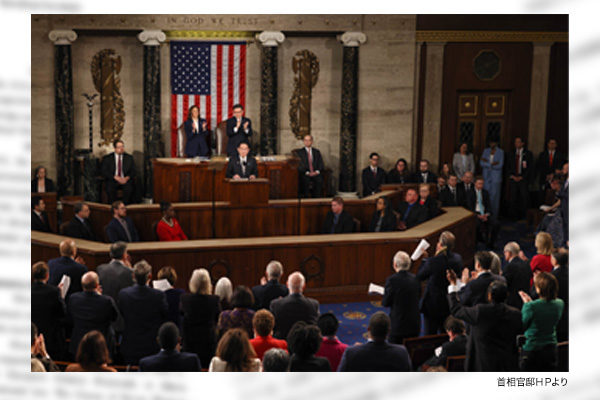Japanese Prime Minister Fumio Kishida met with U.S. President Joe Biden at the White House on April 10 and issued a joint statement titled “Global Partners for the Future.” In a speech to a joint session of the U.S. House and Senate on April 11, Kishida said that Japan and the United States together “carry a large responsibility” to protect the international order.
What is currently disturbing the international order are the wars in Ukraine, the war in the Middle East, and rising tensions in the Taiwan Strait and the South China Sea. In order to fulfill Japanese responsibilities as a global partner not only in words but also in actions in these three regions, Japan must improve domestic structures. Does Kishida have readiness and concrete measures to do that?
Japan unable to export weapons to Ukraine
Ukraine is facing a shortage of weapons and ammunition, and reportedly in an inferior position against Russia. Ukrainian President Volodymyr Zelensky has called on the international community to provide air defense systems and artillery shells in particular. However, Japan cannot export them directly to Ukraine due to factors including opposition from the ruling Liberal Democratic Party’s junior coalition partner Komeito.
To control the number of weapons and ammunition in its possession, Japan has to scrap the existing Patriot Advanced Capability-2 (PAC-2) air defense missiles if its Self-Defense Forces introduce PAC-3 missiles. Similarly, shells for 203mm howitzers are also being disposed of at a cost. It is absurd to discard weapons or shells that would help Ukraine recover from its inferiority.
Late last year, Japan decided to export to the U.S. PAC-2 missiles produced under U.S. license. The exports are designed to cover U.S. inventory shortages arising from U.S. exports to Ukraine, serving as Japan’s indirect support for Ukraine. However, Japan’s arms assistance to Ukraine still remains indirect.
High hurdles to exercise collective self-defense right
In the Middle East, Yemen’s pro-Iranian Houthi militia seized a car carrier operated by Japan’s NYK Line in November last year. A tanker owned by a Japanese company came under a drone attack in the Indian Ocean in December. Nevertheless, Japan is not participating in Operation Guardian of Prosperity by 10 countries, including the U.S., Britain, Canada, France, Italy, the Netherlands and Spain, to fight back against the Houthis.
One of the reasons for Japan to refrain from joining the operation is that Japanese law allows the country to exercise the right of collective self-defense to join such operation only when it is certified that Japan’s survival as a nation is threatened, making the domestic hurdles to the exercise of the collective self-defense right very high.
Although Kishida also attended a first-ever Japan-U.S.-Philippines summit in Washington, Japan’s defense cooperation with the Philippines will also be affected by the domestic hurdles to the exercise of the collective self-defense right.
No domestic law to support Taiwan
The U.S. has provided Taiwan with defensive weapons under the Taiwan Relations Act of 1979 and enabled senior officials’ interactions with Taiwan under the Taiwan Travel Act of 2018. In addition, the National Defense Authorization Act enacted late last year calls for enhanced support for Taiwan, including training of Taiwanese military.
However, Japan does not have such laws, let alone a law to support Taiwan in a military contingency. Regarding Japanese lawmakers’ occasional visits to Taiwan, the Taiwanese side is said to complain that they just take pictures with Taiwanese leaders and do nothing more for Taiwan.
Kishida’s U.S. visit should have led the U.S. to raise its expectations that Japan will play a role as a global partner for the U.S. in the event of an emergency. I’m afraid of the backlash when those expectations are betrayed.
Fumio Ota is a councilor and a Planning Committee member at the Japan Institute for National Fundamentals. He is a retired Vice Admiral of Japan Maritime Self-Defense Force and a former Director of Defense Intelligence Headquarters.


